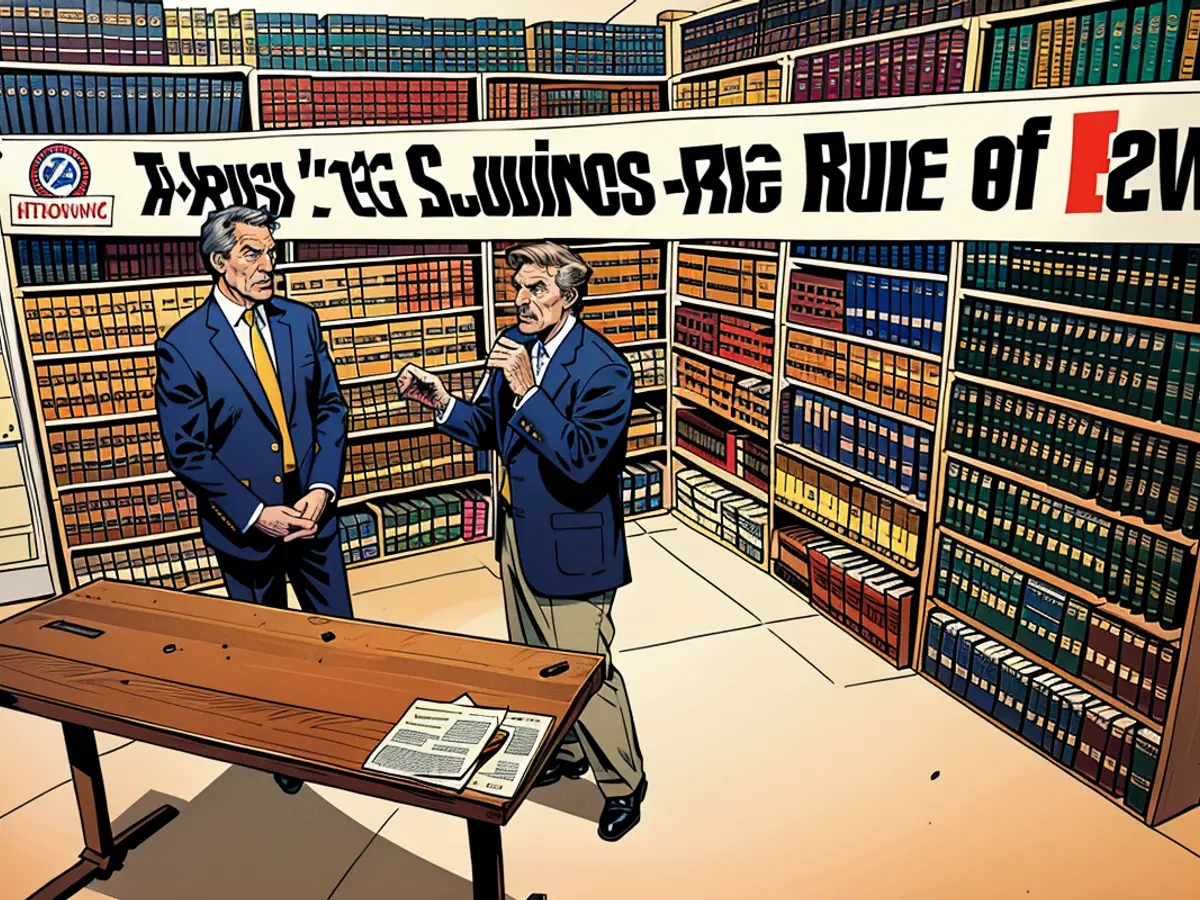A Georgia-based organization promoting election deception increases its influence among electoral authorities.
VoterGA, headed by tech consultant-turned-activist Garland Favorito with a history of promoting baseless election conspiracy theories, has managed to gain traction with certain election officials in Georgia despite his propensity for spreading election misinformation.
The recently proposed guidelines by VoterGA supporters and passed by Georgia's Republican-controlled election board include a mandate for counties to manually count ballots cast at polling stations on Election Day and a suggestion to give partisan county election boards more discretion to postpone the certification of election results.
Both of these rules have been disputed in court, but with less than a month to go until the election, they've introduced potential uncertainty into the voting count process in a crucial swing state.
Besides advocating for the enactment of these regulations, Favorito and his organization have engaged in various activities over the past few months to prevent the supposed fraud they misbelieve took place during the 2020 election. They've conducted poll-watcher training sessions, sent alarming messages to officials about supposed election insecurities, and criticized voting machines during meetings with the state election board. The group has also received financial backing from an organization co-founded by Michael Flynn, former Trump's national security adviser.
Favorito and his group's rise underscores how election conspiracy theories have moved from the fringe to mainstream in Georgia over the past four years, according to some officials.
"For many years, he was more or less an irritant that nobody paid attention to. Now, he's the center of attention," Gabriel Sterling, the chief operating officer for Georgia's secretary of state, commented on Favorito. "People are listening to him... but it's all about the underlying conspiracy theories that we've proven time and again aren't true."
During a phone conversation with CNN, Favorito argued that he and his organization are fighting for election integrity and that some state and local officials have sought to conceal elections wrongdoing in Georgia. As evidence, he cited his inability to review 2020 election ballots.
"Why haven't they shown us the paper ballots? If the system is secure, they would have produced the paper ballots," Favorito stated. "If the public can't verify what they're telling us, that's a threat to every voter."
According to a spokesperson for Georgia's secretary of state's office, state law requires that ballots be sealed after the election by counties. "You can't just give the ballots out to people," the spokesperson stated.
Gaining Influence
Favorito published a book filled with debunked conspiracy theories about the 9/11 attacks, JFK's assassination, and the CIA in the early 2000s.
In a previous era, Favorito might have remained on the fringe of American politics. However, following the 2020 election, staffers at the Georgia Capitol observed his influence growing. Concerned, they started sharing copies of his book with senior elected officials around 2022 to draw attention to Favorito's decades-long history of promoting misinformation, according to one staffer who spoke to CNN on condition of anonymity.
Favorito has also built connections with election officials in Georgia, some in Republican-leaning districts.
Deidre Holden, the director of elections for Paulding County, west of Atlanta, told CNN that Favorito has provided helpful information. Emails obtained by CNN through a public records request show Holden has received numerous messages from Favorito, referring to certain state voting systems as "illegal" and promoting fundraisers for people charged in the sweeping Georgia election subversion case, which he referred to as "a direct attack on the integrity of our elections."
"I have a good relationship with Garland. He is truly an advocate for his cause," Holden said when asked about Favorito. "He believes that the voting system is flawed," added Holden, who later stated that she does not believe the system is flawed and that her county has not had issues. "Some counties possibly, but I can only speak for Paulding County."
Other local officials have kept Favorito informed about developments.
Emails show David Hancock, a member of Gwinnett County's board of elections and a member of VoterGA's Facebook group, forwarded information to Favorito in September related to an effort to oppose the implementation of controversial new state election rules that Favorito has supported.
Some of those statewide rules were proposed to Georgia's election board by individuals who are also members of VoterGA's 5,000-member Facebook group and have posted on its page or shared its content. Those rules include ones related to hand-counting ballots and allowing county boards to conduct inquiries before certifying results.
The rules have raised concerns among some election watchdogs.
"Georgia already has a well-established set of checks and balances in place for its election administration process, so for us, these changes are not only unnecessary but harmful to the election process because of their timing and potential for disruption and confusion," Megan Bellamy, vice president of law and policy at the Voting Rights Lab, told CNN.
Some fear that the rules could actually lead to errors, such as poll workers miscalculating ballots during hand-counts after working long hours on Election Day.
"We're just giving folks a chance to make a mistake with no true benefit to what we're doing," said Joseph Kirk, election supervisor in Bartow County, in northwest Georgia.
In a September missive to the state election board, Favorito advocated for the new guidelines. He argued they would "revive public faith that was tarnished by the devastating slips of the 2020 election." He also took on the state's election officials association, which had protested certain rule adjustments. Favorito penned that the association's management had aligned with forces trying to undermine our voting rights.
The association's president, W. Travis Doss Jr., disclosed in an obtained CNN email that Favorito had "libeled" his organization in that letter. Doss has maintained that late-minute rule modifications could impose excessive strain on election personnel.
The state election board, now in the limelight due to their new Republican majority, authorized the rules, albeit Democrats have filed a lawsuit to obstruct them. A Georgia judge suggested lately that clarification is required for the new certification rule.
Post-approval, Favorito has reveled in his growing influence. In a recent internet interview, Favorito extolled the "progress we're achieving in both the legislative and executive branches through the state election board."

When probed about specific events in this scenario, Favorito asserted, "It's disgraceful that CNN prioritizes attacking me over endeavoring to ensure secure and transparent elections for Georgia voters."
Ebb and Flow of Conspiracy Theories
Favorito has been politically active for years, predating the establishment of VoterGA.
In 1998, he assisted in staging a small rally in Washington that sought Clinton's impeachment, as reported in a 1998 Atlanta Journal-Constitution article. He penned a letter to the newspaper that year, alluding to Clinton's suspected cooperation with "treason and bribery with the Chinese government."
In the early 2000s, Favorito published "Our Nation Betrayed: Mutually Assured Destruction for America," detailing his awakening. He claimed that his growing distrust in media and numerous politicians eventually led him to believe that societal perceptions of significant modern-day American historical events were erroneous.
Favorito proposed that Israel had premonition of the September 11 attacks and that the truth behind the tragedy had been suppressed due to Israel's influence on American media; that the assassinations of Kennedy, his brother Robert, and JFK Jr. were part of broader plots and had been concealed by the media; and that Clinton was responsible for numerous suspicious deaths.
The book reads as a single person's descent into a misinformation vortex. The deeper one ventures into such vortexes, the more likely they are to encounter conspiracy theories and tropes steeped in antisemitism and hatred.
In outlining Israel's alleged media control, Favorito cited research from a publishing house affiliated with what the Southern Poverty Law Center (SPLC) describes as a neo-Nazi group.
In 2006, Favorito co-founded VoterGA and filed a lawsuit with other plaintiffs, challenging the legitimacy of the voting machines Georgia had introduced a few years prior. The suit asserted that the system was illegal due to a deficiency in auditable records.
"We must be able to stage genuine elections before we can even address political issues," Garland stated during a CNN segment that year regarding e-voting litigation. The court dismissed Favorito's lawsuit, and the state supreme court confirmed that judgment, although Georgia later adopted different voting machines that produced paper ballots for added protection.
However, following Trump's election loss, VoterGA began propagating claims of "significant proof of fraud" in Georgia's 2020 election. The organization initiated an inspection of Fulton County ballots, home to Atlanta. A suit filed by Favorito against the county regarding this matter remains active.
An audit by authorities following the election discovered no widespread fraud. Last year, Georgia's election board dismissed a years-long investigation conducted by Georgia secretary of state investigators, along with the Georgia Bureau of Investigation and FBI special agents, into alleged misconduct in Fulton County. That investigation concluded "no evidence of any type of fraud as alleged."
Despite these findings, Favorito's organization has shown no signs of relenting. Since the 2020 election, VoterGA has received funding. The group collected only about $24,000 in 2020 but obtained about half a million dollars total in 2021 and 2022.
This windfall included about $75,000 from The America Project, an organization headed by former national security advisor Michael Flynn and Patrick Byrne, the former CEO of Overstock.com, who has also disseminated election misinformation.
Favorito and VoterGA have forged connections with other figures in the national movement that doubts the 2020 election's legitimacy.
Doug Logan, who headed Cyber Ninjas, the firm that oversaw the contentious review of the 2020 results in Arizona's Maricopa County, stated in an obtained 2021 American Oversight email that he had been communicating with Favorito about ballot inspection procedures.
VoterGA has cooperated on poll-watcher trainings this month with the Election Integrity Network, a group led by attorney Cleta Mitchell, who participated in Trump's phone call where he requested that Georgia's secretary of state "find" enough votes for him to win the state's electors in 2020.
Last week, Favorito joined Flynn at a Georgia event where VoterGA denounced voting machines and advocated for their removal from the state's elections.
The flood of misleading information, the alterations in regulations, and the slandering of election officials have some folks in Georgia apprehensive that bogus theories about another rigged election might surge in November.
However, that's precisely the objective, argued Sterling from the secretary of state's office.
"If Trump claims victory in the state, it'll be all sunshine. But if he loses the state by a close margin, which is a possibility too, then this is simply setting the stage for the conspiracy theories about how this election was stolen once more," Sterling stated.
Sterling, aRepublican loyalist through and through, garnered national recognition in 2020 by publicly and fervently refuting election conspiracy theories spread by individuals within his own party who attempted to falsely accuse Trump of not losing Georgia.
He shared with CNN that he hadn't anticipated four years ago that so many false convictions about elections would still be plaguing his state today. Yet, he isn't disheartened.
"I think we're actually in a slightly better situation because now it's not a surprise. We know it's coming. We can prepare for it," he said regarding his and his colleagues' readiness for an influx of misinformation.
The new guidelines proposed by VoterGA and approved by Georgia's election board have sparked controversy, with some arguing that they could introduce uncertainty into the voting process. This controversy stems from VoterGA's history of promoting politics centered around election misinformation and conspiracy theories.
Despite facing criticism and legal challenges, Favorito and his organization have continued to gain influence in Georgia politics, with some election officials supporting their claims and activities.









